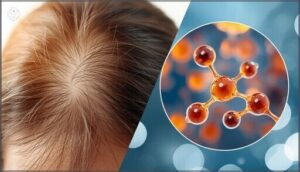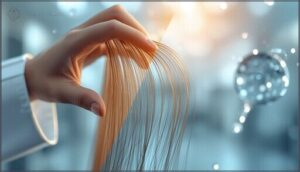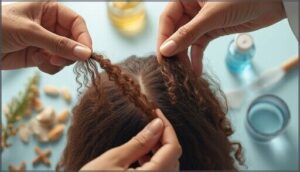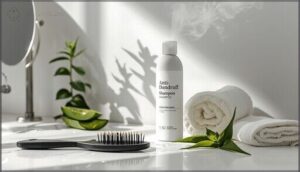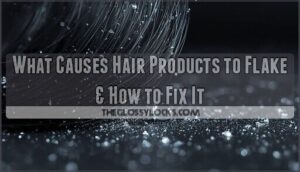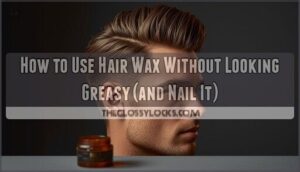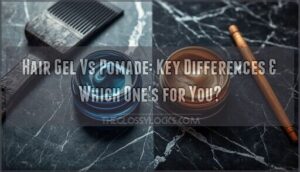This site is supported by our readers. We may earn a commission, at no cost to you, if you purchase through links.
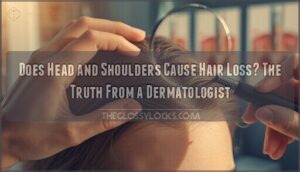
A frantic patient walked into my office last week clutching a half-empty bottle of Head & Shoulders, convinced the shampoo was making her hair fall out. She’d lost enough strands to clog her shower drain and found dozens of internet posts blaming anti-dandruff formulas for thinning hair.
The truth? Her scalp condition was actually worsening the shedding—not the product designed to treat it. This misconception drives thousands of people to abandon effective dandruff treatment every year, often replacing it with alternatives that do nothing for the underlying fungal overgrowth.
Understanding what really causes hair loss when you’re using Head & Shoulders can help you make informed decisions about scalp health without falling for myths that keep you itching and flaking.
Table Of Contents
- Key Takeaways
- Does Head and Shoulders Cause Hair Loss?
- Key Ingredients in Head & Shoulders Shampoo
- How Head & Shoulders Affects The Scalp
- Common Myths About Head & Shoulders and Hair Loss
- Who May Be Sensitive to Head & Shoulders?
- Best Practices for Using Anti-Dandruff Shampoos
- What to Do if You Notice Hair Loss
- Frequently Asked Questions (FAQs)
- Is head and shoulders shampoo harmful for hair?
- Is it bad to use head and shoulders every day?
- Does Head and Shoulders cause hair thinning?
- Does anti-dandruff shampoo cause hair fall?
- Is Head and Shoulders bad for your hair everyday?
- Does dandruff cause hair thinning?
- Will head and shoulders damage my hair?
- Is hair loss a symptom of lupus?
- Can head and Shoulders products cause hair loss?
- How frequently should Head & Shoulders be used?
- Conclusion
Key Takeaways
- Head & Shoulders doesn’t cause hair loss—its active ingredients (zinc pyrithione and selenium sulfide) actually fight the fungal overgrowth and inflammation that damage your scalp and weaken hair follicles.
- Most “hair loss” you notice when washing is normal daily shedding of 50-100 hairs, not product-caused thinning, though harsh sulfates can cause temporary dryness and breakage in sensitive individuals.
- Untreated dandruff creates more scalp damage than the shampoo itself because persistent inflammation and scratching disrupt your hair growth cycle and weaken follicles over time.
- If you experience genuine hair loss (visible thinning, patchy bald spots, or more than 5-6 hairs per gentle tug) lasting beyond three months, consult a dermatologist rather than blaming your dandruff treatment.
Does Head and Shoulders Cause Hair Loss?
Why do so many people suspect their dandruff shampoo might be thinning their hair? Let me put your mind at ease: Head and Shoulders doesn’t cause hair loss when you use it as directed. The active ingredients—zinc pyrithione and selenium sulfide—actually support scalp health by reducing dandruff and calming inflammation. They don’t shrink hair follicles or stop hair growth.
For men dealing with flakes in their facial hair, targeted beard dandruff treatments for Black men address the unique texture and moisture needs of coarser hair.
Head and Shoulders doesn’t cause hair loss—its active ingredients actually support scalp health by fighting dandruff and inflammation
Here’s what you’re probably noticing: You might see more strands in the shower because washing naturally releases hair that’s already in its shedding phase. That’s normal daily loss, not a sign your shampoo is to blame.
Some people do experience temporary dryness or irritation, especially if they’re sensitive to certain shampoo ingredients. But that’s reversible and doesn’t mean permanent damage.
The truth is, untreated dandruff causes more problems for your scalp than the antidandruff shampoo itself. Controlling that Malassezia yeast overgrowth helps create a healthier environment for hair growth. Experts also recommend learning about the latest hair loss treatments and causes to make informed decisions about scalp health.
Key Ingredients in Head & Shoulders Shampoo
Before you blame the bottle in your shower, let’s look at what’s actually inside it. Head & Shoulders contains specific active ingredients designed to fight dandruff, plus several supporting compounds that clean and condition your hair.
Understanding these components helps you separate fact from fiction regarding hair loss concerns.
Zinc Pyrithione and Its Effects
Zinc pyrithione is the workhorse in Head and Shoulders formulas, usually at 1 to 2 percent concentration. It disrupts fungal membrane integrity and targets Malassezia yeasts that trigger dandruff and itching.
This ingredient won’t cause hair loss when you use it as directed. Instead, it maintains scalp balance by controlling microbe overgrowth, which actually fosters healthy hair growth over time.
Selenium Sulfide and Hair Health
Selenium sulfide appears in some Head and Shoulders formulas at 1 to 2.5 percent and offers potent fungal treatment by calming Malassezia yeast. This ingredient delivers scalp relief from seborrheic dermatitis and lowers flaking intensity within days.
You won’t see direct hair growth, but dandruff control reduces scratching damage that weakens strands. Used correctly, selenium sulfide promotes overall hair health without triggering hair loss. For further details about its effectiveness and safety, see these.
Role of Surfactants and Conditioners
Beyond antimicrobial ingredients, you’ll find surfactants like sodium lauryl sulfate that strip dirt and oil from your scalp. These cleansers reduce surface tension so water rinses away buildup, but harsh formulas can dry out strands and trigger breakage.
Conditioning agents—dimethicone and glycerin—coat each hair shaft to lock in moisture and smooth cuticles.
Choosing mild cleansers helps maintain scalp pH balance without causing shampoo side effects or actual hair loss.
How Head & Shoulders Affects The Scalp
Now that you know what’s inside the bottle, let’s talk about what actually happens when Head & Shoulders hits your scalp. The shampoo works through specific mechanisms that affect everything from fungal populations to your skin’s protective barrier.
Here’s what you need to understand about how it influences your scalp environment.
Dandruff Control Mechanism
Your scalp sheds cells constantly, but dandruff accelerates that process. When Malassezia yeast feeds on sebum, it produces irritants that trigger inflammation and flaking.
Pyrithione zinc in Head & Shoulders disrupts this cycle by:
- Reducing fungal growth by roughly 50 percent within days
- Lowering flake formation through yeast suppression
- Supporting balanced scalp health with regular use
This targeted approach controls dandruff without causing hair loss.
Impact on Scalp Microbiome
Your scalp hosts billions of microbes—fungi like Malassezia and bacteria such as Cutibacterium acnes—that influence scalp health. Anti-dandruff shampoos restore microbiome balance by curbing excess fungal growth, which reduces oxidative stress and inflammation.
This shift stabilizes scalp pH and bolsters keratinocyte function, strengthening your skin barrier. A balanced microbiome won’t cause hair loss; it creates the foundation for healthier hair growth.
Potential for Scalp Irritation
Despite its safety profile, Head & Shoulders can irritate sensitive skin. Fragrances, preservatives, and surfactants like sodium lauryl sulfate may trigger contact dermatitis—itching, redness, or burning—especially in those with eczema or color-treated hair.
- Fragrance effects intensify scalp sensitivity in susceptible individuals
- Overuse strips natural oils, causing dryness and tightness
- Gentle formulas like Deep Hydration reduce irritation risk
- Patch testing new products helps identify allergic reactions early
- Alternating shampoos preserves scalp health between dandruff treatments
Common Myths About Head & Shoulders and Hair Loss
Let’s clear the air about what Head & Shoulders actually does to your hair. You’ve probably heard wild claims online about this shampoo causing baldness, and it’s time to separate fact from fiction. Here’s what the science really says about the most common myths floating around.
Debunking Hair Loss Claims
You might hear that Head & Shoulders causes hair loss, but this myth doesn’t hold up under scrutiny. In healthy individuals, the shampoo is unlikely to trigger actual hair loss.
Normal shedding—around 50 to 100 hairs daily—often gets mistaken for product-induced thinning. Hair loss facts point to genetics, hormones, and medical conditions, not your dandruff shampoo.
Misattributed Causes of Hair Shedding
Hair Shedding Myths can lead you astray when you mistake everyday triggers for shampoo side effects. Telogen effluvium from stress or illness, hormonal imbalance around menstruation or menopause, and even medications can disrupt your hair growth cycle and create shedding patterns that have nothing to do with dandruff shampoo.
Common culprits include:
- Seasonal shifts that temporarily increase hair shedding without causing permanent hair thinning
- Nutrient deficiencies like low iron or vitamin D that slow follicle activity
- Heat styling and breakage mistaken for scalp irritation or true hair loss
Misunderstanding Scalp Flaking Vs. Hair Loss
You might notice white flakes on your shoulders and immediately panic about hair loss, but dandruff symptoms and actual hair shedding involve different processes. Flaking causes like dry scalp or seborrheic dermatitis create surface debris, not the follicle miniaturization behind true hair loss.
Scalp irritation can trigger temporary shedding, yet persistent bald patches signal deeper hair loss causes requiring scalp health management and professional scalp treatment.
Who May Be Sensitive to Head & Shoulders?
Head & Shoulders works well for most people, but not everyone’s hair and scalp respond the same way.
Some individuals may experience dryness, irritation, or other unwanted effects based on their unique hair characteristics or sensitivities.
Let’s look at who might need to approach this shampoo with a bit more caution.
Individuals With Dry or Damaged Hair
When dryness already defines your hair, sulfate-heavy formulas in some Head & Shoulders versions can strip what little moisture remains. You’re left facing increased hair breakage and a dry scalp rather than hair loss itself.
I recommend choosing their gentler cleansing lines if dandruff bothers you, pairing them with deep conditioners to protect damaged hair while supporting scalp health management.
Those With Color-Treated or Textured Hair
Color-treated or textured hair demands special care. Sulfates in standard Head & Shoulders formulas can strip dye and fade vibrancy faster than you’d like. For curly or coiled textures, these shampoos may increase dryness and disrupt your hair’s natural porosity balance.
If dandruff bothers you but you want color-safe options, seek gentler zinc pyrithione products that respect your hair’s unique needs.
Allergic or Irritant Reactions
Beyond color or texture concerns, some people develop true allergic reactions or irritant contact dermatitis from Head & Shoulders ingredients. Fragrances, preservatives, and zinc pyrithione can trigger scalp sensitivity—redness, itching, or burning sensations that worsen with repeated allergen exposure. If you notice these signs, stop use immediately.
A dermatologist can patch-test suspects and recommend dermatitis treatment that prevents future reaction flare-ups.
Best Practices for Using Anti-Dandruff Shampoos
Using anti-dandruff shampoo correctly makes all the difference between a healthy scalp and unnecessary irritation. You don’t need to overthink it, but a few smart adjustments can protect your hair while treating dandruff.
Here’s what you should know to get the best results without compromising your hair’s health.
Frequency of Use and Hair Type Considerations
Your scalp doesn’t follow a one-size-fits-all washing schedule, so Head & Shoulders shouldn’t either. To balance dandruff control with hair loss prevention and moisture balance:
- Normal to oily scalps: Wash every 1 to 2 days for gentle cleansing without oil buildup.
- Dry or curly hair: Space washes to every 3 to 4 days to preserve natural oils.
- Fine hair: Every 2 to 3 days prevents limpness.
- High hair porosity or scalp sensitivity: Use milder formulas less frequently to maintain hair care health.
Combining With Moisturizing Conditioners
After using Head & Shoulders shampoo, you’ll want to pair it with a moisturizing conditioner to restore hair hydration and protect against dryness. Gentle formulas with lightweight emollients help maintain scalp balance while preventing the brittle strands that mimic hair loss.
Apply conditioner from mid-lengths to ends, avoiding your scalp to prevent buildup. Leave for 1 to 5 minutes depending on your hair care needs, then rinse thoroughly with cool water to seal the cuticle.
| Conditioner Types | Moisturizer Benefits |
|---|---|
| Silicone-based (dimethicone) | Reduces frizz, enhances shine |
| Cationic polymers | Neutralizes static, improves combability |
| Humectant formulas (glycerin) | Attracts moisture to hair shaft |
| Lightweight oils (argan, jojoba) | Boosts softness without residue |
| Protein-enriched | Reinforces surface, reduces breakage |
Signs to Watch for When Using
Pay attention to how your scalp and hair respond during the first two weeks of use. If you notice changes, they’re often early signals of product compatibility issues or allergic reactions.
- Scalp irritation: persistent itching, burning, or redness that worsens with repeated applications
- Hair texture: increased dryness, tangling, or breakage suggesting over-stripping of natural oils
- Dandruff symptoms: flaking that intensifies rather than improves after consistent use
What to Do if You Notice Hair Loss
Noticing more hair in your shower drain can trigger real anxiety, but don’t panic just yet. The first step is figuring out whether you’re dealing with normal shedding or actual hair loss—and that distinction matters more than you might think.
Here’s what you need to know to make smart decisions about your hair and scalp health.
Differentiating Normal Shedding From Hair Loss
You might worry every time you see hair in the drain, but not all hair shedding signals real trouble. A healthy scalp usually releases 50 to 100 hairs daily as part of normal hair growth cycles. True hair loss shows up as visible thinning or patchy bald spots that change your hair thickness over weeks.
| Normal Shedding | Actual Hair Loss |
|---|---|
| 50–100 hairs per day; even distribution | Clumps of hair; persistently heavy fall |
| Scalp health maintained; no visible thinning | Widening part; receding hairline; bald patches |
| Consistent shedding patterns over time | Sudden increase after stress or illness |
| No scalp symptoms | Redness, itching, or scaling present |
A simple hair pull test can help separate routine daily shedding from active hair thinning. Gently tug a small section—if more than five or six hairs come out, you’re seeing more than typical shedding patterns. Watch for changes in how your part looks or whether new growth feels wispier than before, since miniaturized hairs point toward progressive hair breakage rather than temporary flaking.
When to Switch Shampoos or Seek Advice
If irritation lasts more than four weeks or buildup dulls your hair despite regular washing, it’s time to make a change. Persistent scalp sensitivity often points to an ingredient mismatch rather than serious hair loss.
- Switch to gentle formulas when new itching or burning won’t quit
- Try clarifying shampoos once weekly if product buildup coats your scalp
- Rotate moisturizing options during dry winter months
- Seek dermatologist advice if shedding continues beyond six weeks
Consulting a Dermatologist for Persistent Issues
A dermatologist visit becomes essential when hair loss persists beyond three months or patches of thinning appear suddenly. Your dermatologist can distinguish between temporary shedding and progressive conditions requiring prescription treatments.
They’ll examine your scalp health management routine, suggest gentle shampoo options customized to your needs, and create a hair loss prevention plan that tackles dandruff or dermatitis management alongside protecting your hair health.
Frequently Asked Questions (FAQs)
Is head and shoulders shampoo harmful for hair?
Most people won’t lose a single strand from Head & Shoulders when used correctly. However, harsh sulfates can dry your hair and scalp, causing breakage in some cases—especially if you’re already prone to sensitivity.
Is it bad to use head and shoulders every day?
You can use Head and Shoulders daily if your scalp tolerates it—most formulas are designed for frequent use.
Watch for dryness or scalp sensitivity, and choose gentle formulations if needed.
Does Head and Shoulders cause hair thinning?
Head Shoulders won’t cause hair thinning in most users. Some notice temporary changes in scalp fullness when dandruff improves, but perceived thinning over time usually stems from other factors, not the shampoo itself.
Does anti-dandruff shampoo cause hair fall?
Anti-dandruff shampoo won’t directly damage your follicles or trigger permanent hair loss. However, overuse can dry your scalp and lead to temporary breakage. Most shedding improves once your scalp regains balance.
Is Head and Shoulders bad for your hair everyday?
When you wash your hair daily with Head and Shoulders, you won’t damage it if your scalp needs frequent dandruff control.
However, overuse can strip natural oils, causing dryness and potential breakage in some hair types.
Does dandruff cause hair thinning?
Dandruff alone won’t thin your hair. However, persistent inflammation from seborrheic dermatitis can weaken follicles over time.
Scratching disrupts your scalp and growth cycle, leading to breakage that mimics genuine thinning.
Will head and shoulders damage my hair?
For most people, this shampoo won’t damage hair when used as directed. However, harsh surfactants can strip natural oils, causing hair dryness and breakage risk, especially with frequent use or on color-treated strands.
Is hair loss a symptom of lupus?
Yes, hair loss is a common symptom of lupus. This autoimmune condition causes both scarring and non-scarring alopecia.
Hair regrowth potential depends on inflammation control and whether permanent scalp damage occurred.
Can head and Shoulders products cause hair loss?
No strong evidence links Head Shoulders shampoo to Direct Causation of hair loss. Product Safety studies show Shedding vs Loss usually stems from Indirect Factors like genetics or stress, not side effects of hair products.
How frequently should Head & Shoulders be used?
For most people, two to three times weekly provides effective dandruff control without overdrying.
If you have an oily scalp or persistent flakes, daily use is acceptable—just follow with a moisturizing conditioner.
Conclusion
Picture your shower drain finally clear, your scalp calm instead of inflamed, your hairbrush holding normal amounts of shedding rather than alarming clumps. The evidence is unambiguous: Head & Shoulders doesn’t cause hair loss—untreated scalp inflammation does.
When you understand the difference between addressing symptoms and creating them, you stop abandoning treatments that work. Your scalp deserves accurate information, not internet mythology. Trust the science, monitor your individual response, and consult a dermatologist when shedding persists beyond normal patterns.
- https://headandshoulders.com/en-us/about/transparency/our-active-ingredients
- https://dailymed.nlm.nih.gov/dailymed/fda/fdaDrugXsl.cfm?setid=f28a55cf-eb42-4a0d-a4a3-2bae72b58ac8&type=display
- https://pubchem.ncbi.nlm.nih.gov/compound/Pyrithione-zinc
- https://www.ncbi.nlm.nih.gov/pmc/articles/PMC3232817/
- https://www.researchgate.net/publication/6577325_Metal_Ion_availability_in_mitochondria


